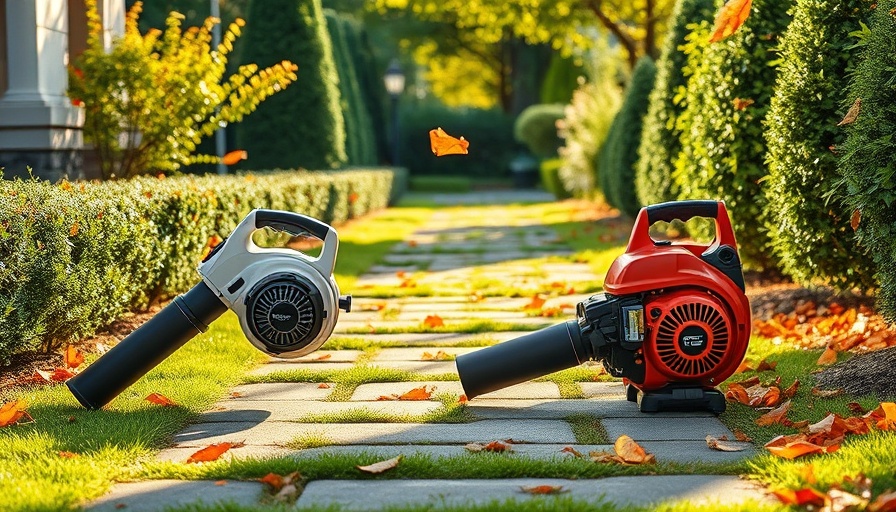
The Ultimate Showdown: Electric vs. Gas Leaf Blowers for Your Home
As a homeowner, maintaining a clean and tidy outdoor space is essential. Leaf blowers have become indispensable tools, offering a swift and efficient way to manage leaves and debris. With advances in technology, the debate between electric and gas leaf blowers has escalated, raising crucial questions about performance, environmental impact, and user experience. This article delves into the science behind these two types of leaf blowers, helping you make an informed decision for your outdoor maintenance needs.
The Basics: Understanding Leaf Blowers
Leaf blowers are designed to simplify yard work, turning what once was a labor-intensive task into a quick and effective chore. Gas-powered models have long been favored for their power and efficiency, but innovations in electric blowers have shifted this trend. Understanding the different functionalities of these two types will help homeowners determine which tool best suits their needs.
Electric Leaf Blowers: Advantages and Features
Electric leaf blowers have surged in popularity due to their user-friendly features and environmental benefits. Available in corded and cordless varieties, electric models provide ample power for small to medium-sized yards. Corded blowers are suitable for locations near an outlet, while cordless models offer the freedom to move without restrictions.
Notably, electric leaf blowers are significantly quieter than their gas counterparts. With sound levels averaging around 50 decibels, they’re a suitable choice for residential areas with noise regulations. Plus, they require minimal maintenance, helping homeowners save on upkeep costs.
Gas Leaf Blowers: Power When You Need It Most
Gas leaf blowers are known for their robust performance, particularly valuable for larger properties or challenging landscapes with stubborn debris. Known for their power, these blowers excel at tasks involving wet leaves or deeply embedded grass foliage. However, they are typically heavier and require more maintenance, including fuel management and engine care.
Despite their advantages in specific scenarios, gas models tend to be disruptive due to noise levels that can reach upwards of 90 decibels. Homeowners must balance the benefits of power with the potential for disturbance in the neighborhood.
A Comparative Analysis: Performance Metrics
So, how do the two types stack up against each other in performance? Studies from sources like Consumer Reports have examined numerous electric and gas leaf blowers through rigorous testing. Across various measures such as airflow efficiency, weight, and ease of handling, both types demonstrate strengths and weaknesses. For instance, gas leaf blowers typically perform better in vacuuming and sweeping tasks, while electric blowers win hands down in noise and handling ease.
Environmental Impact: Going Green with Your Tools
In today’s environmentally conscious world, reducing emissions and noise pollution is vital. Electric leaf blowers boast zero direct emissions, making them a green alternative. Homeowners aiming for sustainable practices may find that investing in electric tools not only benefits the planet but also complies with increasing local noise ordinances.
Deciding Factors for Homeowners
When choosing between electric and gas leaf blowers, homeowners should consider several factors:
- Yard Size: Large spaces may benefit from the power of gas blowers, while smaller yards might be better suited for electric models.
- Maintenance Commitment: Consider how much time and effort you're willing to invest in maintaining your blower.
- Noise Tolerance: Assess whether you prefer a quieter operation for peace of mind and to avoid disturbing neighbors.
- Environmental Concerns: Evaluate the importance of emissions and sustainability in your purchasing decision.
Actionable Insights for Homeowners
Before making a purchase, homeowners should evaluate their specific needs against the key features of electric and gas leaf blowers. Trying engaging in online reviews and product comparisons can foster better decisions and investment. As technology continues to evolve, the landscape of outdoor power tools will become even more advanced, indicating that conducting thorough research will ensure optimal choices for your gardening needs.
Conclusion: Empowering Your Outdoor Experience
Whether you choose an electric or gas leaf blower, the right tool can make yard maintenance quicker and more enjoyable. Remember to weigh your options based on yard size, maintenance needs, and personal preferences. For those ready to explore these choices further, look into retailers that offer comprehensive buying guides and model comparisons. Happy gardening!
 Add Row
Add Row  Add
Add 
Write A Comment